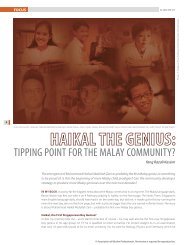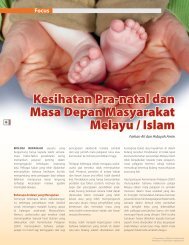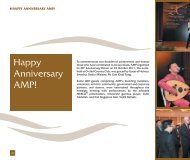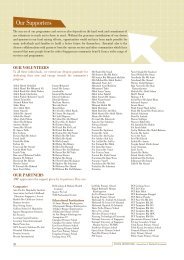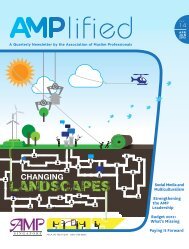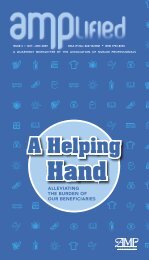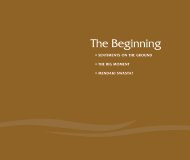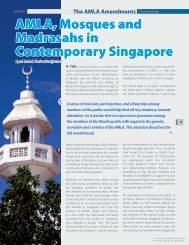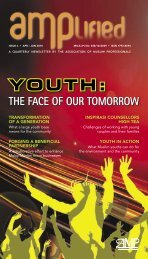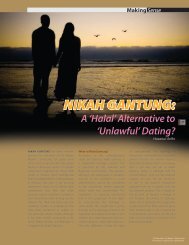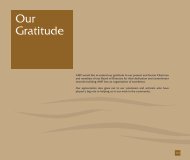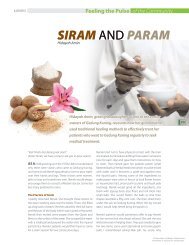The AMLA Amendments - Association of Muslim Professionals
The AMLA Amendments - Association of Muslim Professionals
The AMLA Amendments - Association of Muslim Professionals
You also want an ePaper? Increase the reach of your titles
YUMPU automatically turns print PDFs into web optimized ePapers that Google loves.
Book Review<br />
KARYAWAN<br />
<strong>The</strong>refore, it could be inferred that the Prophet had also been<br />
imbued with such traditions prior to Islam. <strong>The</strong> author views the<br />
period as one which had its own in-depth laws and traditions<br />
covering all aspects <strong>of</strong> social life. When the Prophet received the<br />
divine mission to spread the word <strong>of</strong> Islam, he had the arduous<br />
task <strong>of</strong> changing some entrenched traditions such as paganism<br />
and the strong tribal affiliations. His first mission was the call for<br />
belief in the One True God.<br />
<strong>The</strong> conscious tendency towards legislation via the Quranic<br />
revelation only came during the last few years <strong>of</strong> Prophet<br />
Muhammad’s prophethood. This was when the ummah, or the<br />
<strong>Muslim</strong> community, started to differentiate itself from other<br />
monotheistic and pagan communities <strong>of</strong> that period. <strong>The</strong><br />
insistence that <strong>Muslim</strong>s should be guided by their own laws is<br />
also evident in Surah 5:48 where God revealed: “...for We have<br />
made for each <strong>of</strong> you (i.e. <strong>Muslim</strong>s, Christians and Jews) a law and<br />
a normative way to follow.”<br />
other influential and good figures including the Companions<br />
and Successors, although some <strong>of</strong> the Prophetic Sunnah can be<br />
attributed to them and not the Prophet himself.<br />
Ijtihad or discretionary opinions which were dependent on ilm<br />
or knowledge, refers to the use <strong>of</strong> reasoning in the absence <strong>of</strong><br />
Quranic legislation and the Sunnah in addressing a subject matter<br />
or a legal dispute. This source became a point <strong>of</strong> contention<br />
between traditionalists and rationalists in the later periods <strong>of</strong> the<br />
Islamic era, even to the present day.<br />
Traditionalists viewed discretionary opinions as the products <strong>of</strong><br />
humans and thus not divine and could be rejected. Rationalists<br />
viewed them more positively − that they addressed a subject<br />
matter that was not covered by the other two sources. Also, the<br />
Prophetic Sunnah does consist <strong>of</strong> some form <strong>of</strong> a discretionary<br />
opinion. Hallaq quotes excellent examples to illustrate this in<br />
his book.<br />
40<br />
However, it should be noted that the differentiation was because<br />
Islam was still in its infancy and there was a need to disassociate<br />
<strong>Muslim</strong>s from other religions or communities, as it was also<br />
revealed in the Quran that it was just reinforcing the Truth found<br />
in past monotheistic religions (Surah 5:48).<br />
In his book, Wael Hallaq also narrates the development <strong>of</strong> the<br />
judicial system and processes; the evolution <strong>of</strong> the Islamic legal<br />
schools and thoughts; and the evolution <strong>of</strong> the legal sources<br />
that Islamic law draws upon. Hallaq notes that the early qadis,<br />
including the caliph Umar himself, drew on three sources in<br />
legal disputes. <strong>The</strong> first source is the Quran itself which cannot<br />
be denied as it is divine. <strong>The</strong> second source is the Sunnah – the<br />
Traditions <strong>of</strong> the Prophet. <strong>The</strong> last source is ijtihad or ra’y or<br />
discretionary opinion, a major source <strong>of</strong> legal reasoning and<br />
thus, judicial rulings <strong>of</strong> the entire first Islamic century.<br />
Sunnah, or in its plural form sunnan, is an ancient Arab concept,<br />
meaning an exemplary mode <strong>of</strong> conduct by a highly regarded<br />
individual which in due time became the accepted values and<br />
course <strong>of</strong> actions by the community. <strong>The</strong> verb sanna has the<br />
connotation <strong>of</strong> “setting or fashioning a mode <strong>of</strong> conduct as an<br />
example the others would follow”. <strong>The</strong> early judges or qadis<br />
referred to the sunnan, and not just the Prophetic Sunnah, to<br />
deliberate on their judicial rulings.<br />
<strong>The</strong> reference in this review to the legal sources <strong>of</strong> Islamic law is<br />
not to draw readers’ attention to the cause <strong>of</strong> the traditionalists or<br />
the rationalists in Islamic history. It is for our understanding <strong>of</strong> the<br />
evolution <strong>of</strong> Islamic Law in light <strong>of</strong> the <strong>AMLA</strong> amendments. <strong>The</strong><br />
provisions in <strong>AMLA</strong>, consistent with the fundamentals <strong>of</strong> Islamic<br />
jurisprudence, draw mainly from two legal sources − the Quran<br />
and the Prophetic Sunnah.<br />
<strong>The</strong>re also exists in the fundamentals <strong>of</strong> Islamic jurisprudence,<br />
as shown by Hallaq in his book, a third legal source which is<br />
Ijtihad or discretionary opinion. This source was widely used<br />
during the earlier period <strong>of</strong> Islam to ensure that justice and<br />
moral convictions were upheld.<br />
In the context <strong>of</strong> today, it is imperative to ask whether ijtihad<br />
– or musyawarah, if decided by a consensus – is used in the<br />
deliberation <strong>of</strong> the legal process <strong>of</strong> <strong>AMLA</strong>. Is there some form<br />
<strong>of</strong> ijtihad in the qadis or judges’ legal ruling Or are the rulings<br />
based on the letter <strong>of</strong> the law When, then, does the process <strong>of</strong><br />
ijtihad come into play Is it during the appeal process Would this<br />
legal deliberations and outcomes be used for future and similar<br />
cases How would this affect future amendments <strong>of</strong> <strong>AMLA</strong><br />
especially those provisions that are seen to be Shariah Law<br />
<strong>The</strong>se are questions that need some deliberation.<br />
<strong>The</strong> importance <strong>of</strong> the Prophetic Sunnah only emerged later<br />
when the next generations <strong>of</strong> <strong>Muslim</strong>s, who were born into<br />
the religion and thus more imbued with its traditions and<br />
customs, insisted that <strong>Muslim</strong>s are guided only by the Sunnah<br />
<strong>of</strong> the Prophet. <strong>The</strong>y drew a distinction from the sunnah <strong>of</strong><br />
<strong>The</strong> writer is a Research Officer with the Centre for<br />
Research on Islamic and Malay Affairs (RIMA), the research<br />
arm <strong>of</strong> the <strong>Association</strong> <strong>of</strong> <strong>Muslim</strong> Pr<strong>of</strong>essionals (AMP).



